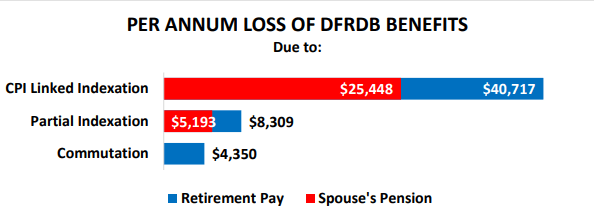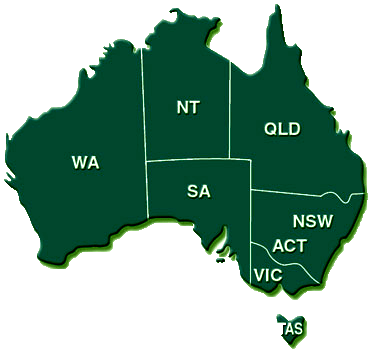The Australian Defence Force Retiree’s Association Inc represents the interests of Defence Force retiree’s regarding their Superannuation.
We continue to see in emails we receive, DFRDB social media sites and DFWA National ENews Issue 5 that the provisions of the DFRDB Act and their effects are still not well understood.
While in recent times the focus has been on Commutation, the detrimental effect of the benefit adjustment (indexation) provisions in the DFRDB Act has, from the day we retired, been far more significant, because:
- Increases of our benefits, until 2014, were based solely on the Consumer Price Index; and
- A part of our retirement pay and invalidity pay has not been indexed, from the date we retired.
Consumer Price Index (CPI) Linked Indexation
In 1976, the Government introduced automatic adjustments which updated the portion of all Commonwealth Superannuation scheme pensions, paid from the Consolidated Revenue Fund (CRF), by the increase in the Consumer Price Index (CPI).
But as already observed by the Jess Committee in its 1972 report, the CPI failed to fairly represent changes in general community standards.
In 2014, the DFRDB (Fair Indexation) Act introduced a fairer indexation methodology. This Act was an admission of unfair indexation, but the Government of the day failed to restore our benefits to the Fair Indexation Baseline which that Act established. Instead, it locked in the losses we sustained due to CPI Linked Indexation, for the rest of our lives.
The effective reduction of our benefits resulting from CPI Linked Indexation varies with the time of retirement. For a majority of us, who retired during the decade from the early to mid1980s, it will be in the region of 35% per annum when we reach our Actual Life Expectancy (currently is 87 years of age). The effect of this will flow on to our Spouses’ pension entitlements.
Partial Indexation
The CRF funds 100% of our DFRDB benefits, but unlike the Commonwealth Superannuation Scheme and the DFRB scheme, a part is not indexed. The part excluded is from 11% to 40%, depending on our gender, age on retirement, when we retired and whether or not we commuted.
The effect for the majority of us will be a further reduction in the region of 11% per annum on top of the impact of CPI Linked Indexation. This effect also flows on to our Spouses’ pension entitlements.
Commutation
We are all now aware of the inequity of the life-time reduction of retirement pay or invalidity pay in exchange of our commutation lump sums provided to help us re-settle into civilian life after 20 or more years of service.
The effect of continued reduction after our 1962 Notional Life Expectancy will be a further reduction in the region of 7% per annum.
Example of these Effects
For a LtCol who retired in 1987 at the age of 49 after 33 years of service and commuted 4.2 years of his retirement pay entitlement, this will be the effect when he reaches his Actual Life Expectancy of 87 years of age.

For the LtCol this means a reduction from $112,933 to $63,907 per annum, and for his Spouse it means a reduction from $70,583 to $39,942 per annum.
As is evident, the detriment caused by CPI Linked and Partial Indexation is far more significant than that caused by the inequitable Commutation arrangement.
Need for a United Front
From the outset, ADFRA’s objectives have been:
1. The removal of the partial indexation provision;
2. The restoration of DFRDB benefits to the Fair Indexation Baseline;
3. The cessation of Retirement Pay Reduction after Notional Life Expectancy; and
4. The refund of Retirement Pay Reductions after Notional Life Expectancy.
While other ex-service organization memberships have been decreasing, ADFRA’s continues to grow because we understand the DFRDB Act, and are seeking redress of its inequitable and discriminatory effect on DFRDB beneficiaries.
The focus on Communication and the resultant sham that was the Ombudsman’s investigation was a distraction. But it is now time for other ex-service organizations (ESOs) and social media groups to support ADFRA taking the lead in addressing these issues.
Memorandum of Understanding
We have developed a non-binding Memorandum of Understanding (MOU) that we will distribute to some of the 1,500 ESOs in the country and ask them to commit to ADFRA taking the lead in DFRDB negotiations with the Government. This is to try and overcome the fragmented approach of so many ESO’s trying to get face to face communication with Minister Chester. Supporting ESOs would be encouraged to raise the DFRDB issues with their Local Members/Senators while we would use their membership numbers and represent them on a national level.
If you are a member of other ESOs, we ask you to speak to them and help us to establish a united front.
The Effect of COVID-19
COVID-19 has had an unprecedented effect on the Australian Economy and while it doesn’t make the provisions in the DFRDB Act any less inequitable or the effects any less detrimental, to pursue our claim at this time would be irresponsible and futile. We will monitor the situation and determine when it will be appropriate to resume our campaign.
DFRDB CDDA Scheme Application
We did consider it appropriate to test the Compensation for Detriment caused by Defective Administration (CDDA) scheme. Herb has already submitted an application which could serve as a test case. You can view Herb’s submission here: https://www.adfra.org/docPDF/DFRDB_CDDA_Application_-_Herbert_Frank_Ellerbock.pdf
Everyone is entitled to lodge a CDDA application, but before we all expend a lot of time and effort, it may be appropriate to await the outcome of this application. If the basis of rejection is as implied in the reply already received, it may enable us to mount a legal challenge.
The conversation, to date, with the Directorate of Special Financial Claims (DSFC), Defence Legal can be viewed here. https://www.adfra.org/docPDF/Reply_to_CDDA_Application.pdf If you want to know more about DSFC, this is their web site: https://www.defence.gov.au/Legal/Directorates/dsfc.asp
ADFRA Committee Meeting
On 19 March 2020, we held the first of the four Committee Meetings our Constitution requires us to hold per annum. We will post the Minutes on our web site in due course.
Donations
Thank you to those who have donated to ADFRA. Our apologies for not being able to thank each of you personally. Your donations will allow us to recover some of the costs of hosting our web site and various other ancillary costs. More particularly, when the time is right again, it will enable us to travel more extensively to present and argue our case. For those asked for our Bank Account details again, they are: Account Name: Australian Defence Force Retirees Association Inc. BSB Number: 640 000 Account Number: 111 280 106
ADFRA Membership
Membership of ADFRA is free. If you have not yet registered with ADFRA, then please do it today. To be a force in representing you, we need the numbers.
Jim Hislop
President



